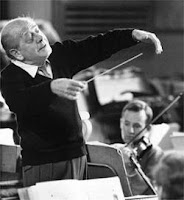Blogger Simon Bielman wrote in a recent post, "Should we stop playing Beethoven?" He continues:
Learning, practicing, and playing Beethoven frustrates me to no end and often makes me depart from the piano in disgust. This happened to me today, not even ten minutes ago, but why? Is it because I simply don’t like Beethoven? I’ll admit he’s not my favorite, but I’m certainly not arrogant enough to consider him a bad composer. In fact, I’m listening to the Pathetique Sonata right now and quite happy about it.
Perhaps I’m frustrated with the quality of my own performance.
Maybe it’s because I can never voice those runs of thirds in the right hand
exactly how I want them. That’s certainly irritating, but I have similar
frustrations with other pieces and I’m always eager to put the hours in to iron
out sloppy passages and work on
subtle details.
Well, usually, anyways. Sometimes I’d rather just eat a
sandwich....
What makes me leave the room is because playing Beethoven is
absolutely and completely pointless.
Now, I know what you’re thinking: “But Simon, music is
necessary for the soul, and Beethoven wrote some of the greatest music ever
written! What right do you have to make a statement like that?” Well, I’m still
listening to Beethoven piano sonatas, so I certainly can’t disagree. In fact, I
was overjoyed when I had the opportunity to claim the complete Richter
recordings as my own.
But this is exactly where my frustration begins....
My frustrations really don’t lie with Beethoven or have anything to do with the music he wrote. They are with the current state of the classical music world, its establishment, and the mindset regarding new music. There will always be a place for great orchestras to play great art from the past, and pianists should certainly keep learning to play Beethoven for their own enjoyment and fulfillment. However, if any of us want to have a career, we’ll need to find some new music that inspires us in the same way that our favorite composers have, or start composing ourselves. There are reasons why young students dedicate their entire lives to learning Chopin. Maybe we should write some more.
I’m going to go eat a sandwich.
For Mr. Bielman's complete comments, visit his blog here.
I do have some of the same frustrations that Simon does although my own stem from almost completely ignoring some of the great music of both past and present that does not appear on concert programs. I am continually amazed at hearing radio performances of works I've never heard. For example, Bill McLaughlin (of St. Paul Sunday and Exploring Music) is examining what he calls "American Masters" this week in the latter program.
Monday (2/27) program included works of Franz Waxman, Don Gillis, Wayne Barlow, Paul Bowles, and Alec Wilder. Last evening's (2/28) program, I did catch in its entirety and, although I am more than a bit familiar with the two composers he played--Bernard Herrmann and Leroy Anderson--I did not know the works presented from Mr. Herrmann, which did not include any of the film music for which he is so well known. Instead, listeners were offered movements from his first symphony and a piece written during the Second World War, For the Fallen A Berceuse. The symphony is as good as any other American symphony and the Berceuse as poignant an elegy as one could desire. While I am glad I have added new works to my own "internal repertoire," I am saddened that I am encountering these works for the first time at middle age.
Do I (we) need another performance of a Beethoven (or Schubert, Brahms, Dvorak--you name it) symphony, or has the time come to try to escape the bonds of this museum repertoire and attempt to reach today's audience. Greg Sandow notes that young people are coming to new music in Great Britain. The following quotes come from an article in The Guardian:
In a world where listeners no longer define themselves along firm genre lines, music is increasingly just that – music. As a result, we are now witnessing a musician-led movement gleefully adopted by listeners, in which classical is being rebranded from the ground up. Even the term “classical” itself seems obsolete in the face of what’s being produced and consumed.
***
[The increased audience for [edgy contemporary] works is the result of a campaign to reach people interested in the cutting edge of other contemporary art forms, rather than those who prefer to hear Beethoven.
***
It’s the weirdest pieces which get the strongest reaction….People are looking for something to get their teeth into.
***
[]M]any people arrive at the avant garde of contemporary music via the wilder shores of pop. Certainly our artistic institutions can reach out to a contemporary audience with contemporary music. This is music being written by composers we have probably yet to meet. In the meantime, I'll continue to learn from Mr. McLaughlin.
Tonight (2/29): An entire evening of Lou Harrison (I've actually conducted one of his works!)
Thursday (3/1): Howard Shapero and George Rochberg.
Friday (3/2): An entire evening of Morton Gould (and mostly pieces of which I am unfamiliar.)
Thank you Simon. Thank you Bill.

















